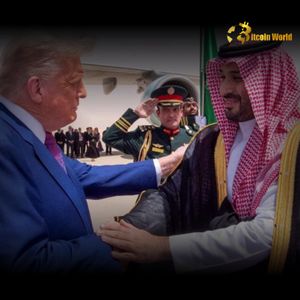Urgent Iran Plea: Gulf States Asked to Pressure Trump for Ceasefire
5 min read
BitcoinWorld Urgent Iran Plea: Gulf States Asked to Pressure Trump for Ceasefire In a significant diplomatic maneuver, Iran has reportedly reached out to key regional players, Qatar, Saudi Arabia, and Oman, with a specific request. The aim? To leverage their influence to persuade former U.S. President Donald Trump to pressure Israel for an immediate ceasefire. This intriguing development, initially reported by Reuters and highlighted by Walter Bloomberg on X, signals a complex web of regional dynamics and strategic bartering. Why Turn to the Gulf States for Iran Ceasefire Efforts? The choice of Qatar, Saudi Arabia, and Oman as intermediaries is deliberate and reflects the nuanced relationships within the Middle East and with the United States. Each of these nations holds unique standing: Qatar: Often plays a mediating role in regional conflicts and maintains channels with various international actors, including the U.S. and groups involved in the conflict. Saudi Arabia: A major regional power and a close strategic partner of the United States. While relations with Iran are complex, there have been recent efforts towards de-escalation and dialogue. Riyadh’s voice carries significant weight in Washington. Oman: Traditionally acts as a neutral broker in the region, often facilitating backchannel communications between adversaries, including Iran and the U.S. By approaching these specific Gulf states, Iran appears to be seeking multiple avenues to influence U.S. policy towards Israel, hoping that their collective or individual pressure points could be effective. The Nuclear Negotiations Link: What Flexibility Means Perhaps the most striking element of this report is Iran’s reported offer of flexibility in nuclear negotiations with the U.S. in exchange for this diplomatic assistance. This ties two seemingly distinct issues – regional conflict and nuclear talks – together, revealing Iran’s strategic approach to international relations. Flexibility in nuclear talks could encompass various aspects, such as: Willingness to return to the negotiating table regarding the Joint Comprehensive Plan of Action (JCPOA). Potential adjustments to enrichment levels or stockpile limits. Greater transparency or access for international inspectors. Discussion on other related issues like ballistic missiles or regional activities (though historically, Iran has been resistant to including these). Offering this flexibility serves as a potential incentive for the U.S. to consider Iran’s ceasefire request seriously, albeit indirectly through its influence on Israel. It positions the ceasefire as a potentially achievable outcome linked to a major U.S. foreign policy goal: curbing Iran’s nuclear program. Challenges and Opportunities in Middle East Diplomacy This reported request highlights the intricate nature of Middle East diplomacy . While the offer of nuclear flexibility presents a potential opportunity for renewed dialogue between the U.S. and Iran, several challenges exist: U.S. Political Landscape: The request specifically names Donald Trump, who is currently not in office. While he remains a significant political figure, the current administration under President Biden handles official foreign policy. This adds a layer of complexity regarding who Iran believes holds the relevant influence or who they prefer to negotiate with. Gulf States’ Position: While willing to mediate, the Gulf states have their own interests and relationships to balance, particularly their security ties with the U.S. and their complex interactions with both Israel and Iran. Israel’s Stance: Any decision regarding a ceasefire ultimately rests with Israel, which has its own security imperatives and strategic objectives in the ongoing conflict. Trust Deficit: Decades of mistrust and conflict between the U.S., Iran, and regional players create a significant hurdle for any substantial diplomatic breakthrough. Despite these challenges, the willingness of Iran to link nuclear talks to a regional ceasefire, and its outreach to key Gulf states, suggests a potential window for de-escalation and negotiation, however narrow. Understanding US Iran Relations Through This Lens The dynamic between the US Iran relations is a constant factor in Middle East stability. This latest development underscores the indirect pathways often used in their interactions. Instead of direct communication, Iran is reportedly using intermediaries to convey a message and an offer to a former U.S. president. This highlights the lack of direct high-level diplomatic channels and the reliance on regional partners to bridge the gap. The U.S. has consistently stated its goals regarding Iran: preventing nuclear weapon acquisition, countering regional destabilization, and addressing human rights concerns. Iran, conversely, seeks sanctions relief, security guarantees, and regional influence. The reported offer attempts to align Iran’s desire for a ceasefire with a U.S. priority (nuclear talks), demonstrating a strategic attempt to find common ground, even if through a convoluted route involving regional partners and a former U.S. leader. Actionable Insights: What Does This Mean? For observers of geopolitical events and those tracking international relations, this report offers several key insights: Interconnectedness: Regional conflicts and nuclear proliferation issues are deeply intertwined in the Middle East. Solutions often require addressing multiple fronts simultaneously. Role of Intermediaries: Third-party mediators like Qatar, Oman, and potentially Saudi Arabia remain crucial facilitators in resolving complex international standoffs where direct talks are difficult. Strategic Bartering: Nations like Iran are willing to use leverage points (like nuclear program flexibility) from one area to achieve goals in another (like influencing a ceasefire). Importance of Regional Dialogue: The involvement of Gulf states emphasizes the growing importance of intra-regional dialogue in addressing shared security challenges and facilitating broader diplomatic efforts. While the outcome of this reported request remains uncertain, it provides a fascinating glimpse into the high-stakes diplomatic maneuvering occurring behind the scenes in the Middle East. Conclusion: A Glimmer of Diplomacy? The report of Iran asking Gulf states to press Donald Trump for an Israel ceasefire, linked to flexibility in nuclear negotiations, is a powerful reminder of the complex, multi-layered nature of Middle Eastern geopolitics. It highlights the critical roles played by regional intermediaries and the strategic calculations involved in international relations. While achieving a lasting ceasefire and resolving nuclear standoffs are monumental tasks fraught with challenges, every diplomatic overture, no matter how unconventional, represents a potential step towards de-escalation and dialogue. Keeping a close watch on the responses from the Gulf states, the U.S., and Israel will be crucial in understanding the potential impact of this intriguing development on the future trajectory of the region. To learn more about the latest Middle East diplomacy trends, explore our article on key developments shaping Iran foreign policy and regional stability. This post Urgent Iran Plea: Gulf States Asked to Pressure Trump for Ceasefire first appeared on BitcoinWorld and is written by Editorial Team

Source: Bitcoin World



